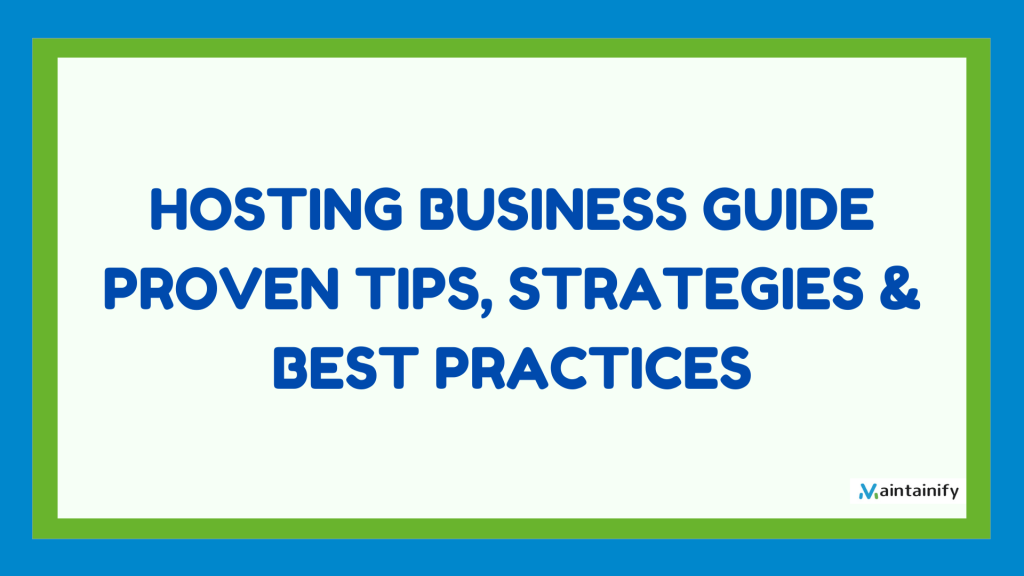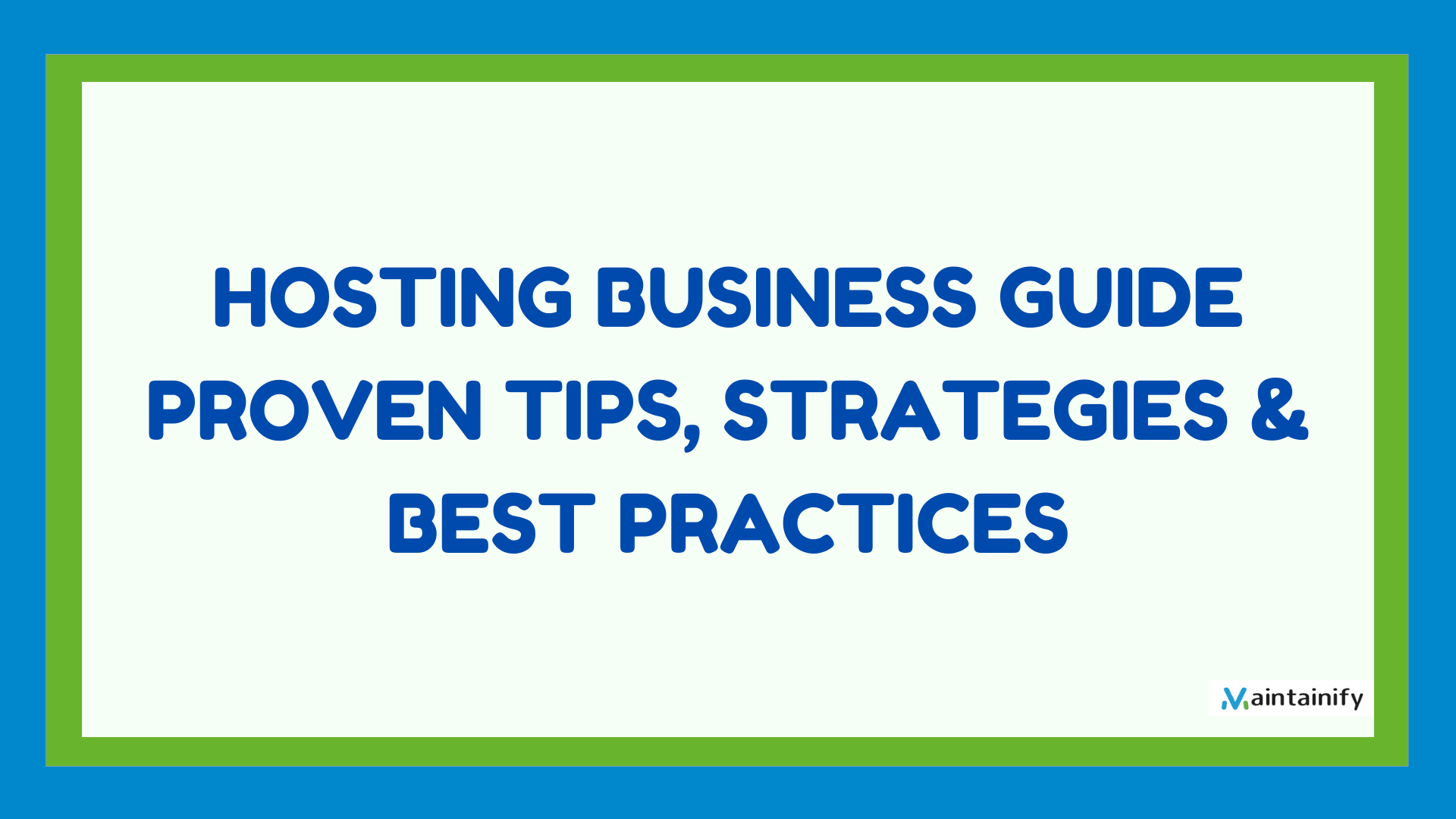Starting a hosting business is one of the most promising entrepreneurial ventures in the digital era. As more businesses, creators, and organizations move online, reliable web hosting has become the backbone of their digital presence. This hosting business guide will walk you through everything from understanding the industry to building a profitable company.
What is Web Hosting?
At its core, web hosting is the service of storing and delivering websites on the internet. Think of it as renting space on a server so that websites can be accessible 24/7. Without hosting, websites wouldn’t exist in the online world.
Why Start a Hosting Business in 2025?
-
Rising Demand: More startups, e-commerce stores, and blogs are being created daily.
-
Recurring Revenue: Hosting provides monthly and annual income streams.
-
Scalability: Once your infrastructure is set, you can onboard thousands of clients with minimal added costs.
-
Opportunities in Niche Markets: Specialized hosting (WordPress hosting, gaming hosting, eco-friendly hosting) is booming.
Understanding the Hosting Industry
Market Trends and Growth Opportunities
The hosting industry is projected to grow at a compound annual growth rate (CAGR) of over 15%. With cloud adoption, AI-driven hosting, and cybersecurity demand, opportunities are endless.
Types of Web Hosting Services
-
Shared Hosting: Affordable, entry-level hosting for small websites.
-
VPS Hosting: Provides dedicated resources at a lower price.
-
Dedicated Hosting: Full server for high-traffic websites.
-
Cloud Hosting: Scalable and flexible for modern businesses.
-
Reseller Hosting: Perfect for entrepreneurs who want to start with low investment.
Building the Foundation of Your Hosting Business
Defining Your Niche and Target Audience
Instead of competing with giants like Bluehost or HostGator, focus on a niche:
-
WordPress hosting for bloggers
-
Gaming server hosting
-
Green hosting powered by renewable energy
Legal Requirements and Business Registration
Before launching, register your business, set up proper accounting, and comply with internet data laws (like GDPR).
Choosing a Reliable Data Center and Infrastructure
Your data center is the backbone of your hosting business. Look for providers with:
-
99.9% uptime guarantee
-
Security certifications (ISO, SOC 2)
-
Scalability options
Essential Tools and Technology Stack
Control Panels and Automation Software
WHM, cPanel, and Plesk simplify account management. Automation tools reduce manual tasks.
Security Tools and SSL Certificates
Security is a deal-breaker for clients. Always include SSL, firewalls, and DDoS protection.
Billing & Customer Management Systems
WHMCS and ClientExec help manage billing, customer tickets, and subscriptions.
Marketing Your Hosting Business
Building a Professional Website
Your website is your storefront. Make it sleek, fast, and mobile-friendly.
SEO Strategies for Hosting Companies
Target keywords like “cheap hosting,” “best VPS hosting,” or “WordPress hosting.” Consistently create blogs, case studies, and tutorials.
Paid Ads, Influencers, and Social Media
Combine SEO with paid campaigns on Google, YouTube, and LinkedIn. Partner with influencers in tech and entrepreneurship.
Customer Support and Service Excellence
Why 24/7 Support Matters
In the hosting business, downtime or technical issues can cost clients thousands of dollars. Offering 24/7 live chat, ticketing, or phone support ensures trust and reliability. Customers prefer hosts who can resolve issues instantly.
Building Trust and Long-Term Relationships
Support isn’t just about solving problems. Provide knowledge bases, video tutorials, and onboarding guides. A client who feels supported is more likely to renew their plan and refer others.
Pricing Strategies and Revenue Models
Subscription vs. Pay-as-You-Go
-
Subscription Models: Offer monthly and yearly packages. Yearly plans boost cash flow.
-
Pay-as-You-Go: Flexible for startups who want to scale as they grow.
Offering Bundled Services
Hosting companies often increase revenue by bundling:
-
Domains
-
Business emails
-
SSL certificates
-
Website builders
This creates value and improves customer retention.
Scaling and Growing Your Hosting Business
White Label Partnerships and Reseller Programs
Partner with larger hosting providers and offer white-labeled services. This reduces infrastructure costs while allowing you to scale quickly.
Expanding to Cloud and Managed Services
Adding cloud hosting, managed WordPress, or managed IT services can diversify income streams and attract premium clients.
Challenges in the Hosting Business and How to Overcome Them
Competition and Price Wars
The industry is crowded, and price wars are common. Instead of lowering prices endlessly, focus on:
-
Superior support
-
Niche specialization
-
Added-value services
Security Threats and Downtime Risks
Cybersecurity attacks are rising. To protect clients, invest in:
-
DDoS protection
-
Automated backups
-
Malware scanning
-
Regular server updates
Future of the Hosting Industry
AI and Automation in Hosting
AI-powered monitoring tools can predict server failures before they happen. Chatbots improve customer service efficiency, and AI-driven scaling ensures uptime.
Edge Computing and Green Hosting
With IoT and 5G growth, edge computing (servers closer to users) will rise. Likewise, eco-conscious clients are choosing green hosting providers that use renewable energy.
FAQs
1. Is starting a hosting business profitable?
Yes, hosting is profitable because of its recurring income model. With the right niche and marketing, you can scale quickly.
2. How much does it cost to start a hosting business?
Costs vary. Reseller hosting can start under $50/month, while setting up your own infrastructure may require $10,000+.
3. Do I need technical skills to run a hosting company?
Not always. Many hosting companies use white-label providers and automation tools. However, basic knowledge of servers, networking, and security is beneficial.
4. How do I attract my first hosting clients?
Leverage SEO, content marketing, social media ads, and offer attractive launch discounts. Partnering with local businesses also works.
5. What is the most popular type of hosting in 2025?
Cloud hosting and managed WordPress hosting are growing fastest due to scalability and ease of use.
6. Can I compete with big players like GoDaddy or Bluehost?
Absolutely! Focus on a niche (e.g., eco-hosting, gaming servers, or local businesses) rather than trying to compete head-to-head.
Conclusion
Starting a hosting business may seem daunting, but with the right foundation, tools, and strategy, it’s a highly rewarding venture. The key is to choose a niche, provide excellent customer service, and build long-term trust.
The future of hosting is bright, with opportunities in AI-driven automation, cloud solutions, and eco-friendly hosting. By following this hosting business guide, you can confidently take your first step toward building a profitable online venture.




